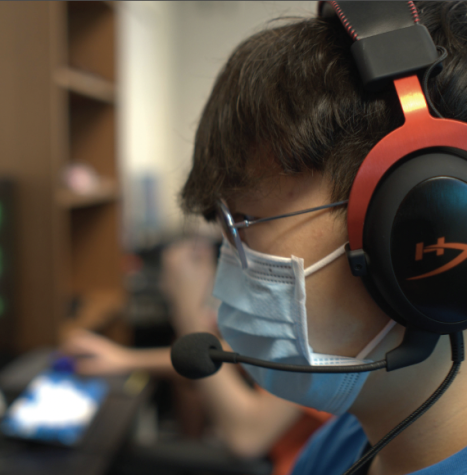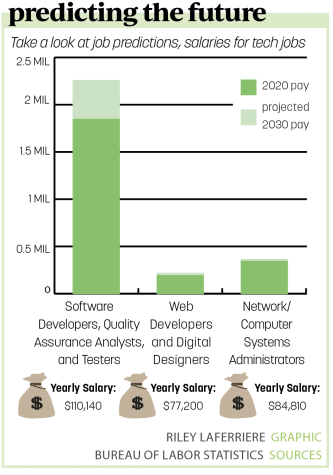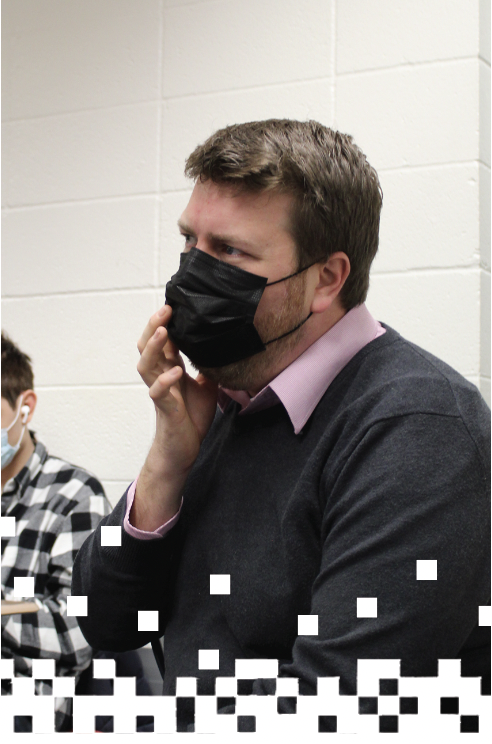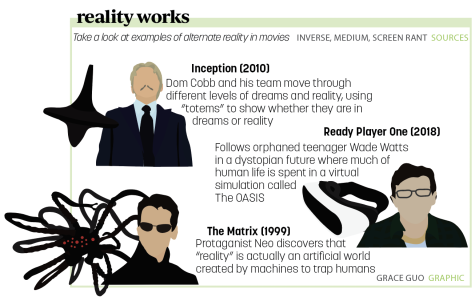Your donation will support the student journalists of Carmel High School - IN. Your contribution will allow us to purchase equipment and cover our annual website hosting costs.
With increase in virtual reality usage, students, teachers define effects of living in a digital world on an individual, view on reality
January 20, 2022
We live in a world where almost everyone plays video games, creating connections virtually and immersing themselves in an alternate version of our reality.
According to a 2018 Pew Research study, 90% of teens play video games on a computer, game console or cell phone.
For a large number of people, video games serve the purpose of recreation. However, for some students such as senior Nicolas “Nico” Zimmowitch, video games serve a greater purpose.

As president of the Carmel eSports club, Zimmowitch said through eSports, he has found opportunities to coach and create content in the field of video games. Resultantly, Zimmowitch said video games have become a significant part of his life, with him playing “Rocket League” almost everyday. From playing video games often, Zimmowitch said that he observed many social and psychological benefits, particularly as he created connections with others virtually.
“Socially, video games allow people to find social circles, whether online or in their local community. Finding people that have something in common with you can be difficult, especially for (people) that may be moving to a new city, switching schools or getting a different job. Through video games, people can stay connected over long distances no matter where they live,” Zimmowitch said.
Despite debate among psychologists and other health professionals regarding the effects of violent media on youth, American Psychological Association studies in 2013 and 2014 found that children engaged in video games had improved cognitive skills and problem-solving skills, along with social connections they developed by playing with other individuals they meet in this “virtual world.”

Similar to Zimmowitch, junior eSports member Logan O’Connell said he plays video games daily for one to two hours. O’Connell said he thinks video games benefit him by allowing him to connect with others as well as offering relaxation.
“Video games can have many benefits, such as offering relaxation and balance to life and can help (form connections between) people socially,” O’Connell said. “As a former professional video game player, I was signed to a professional team, (a position which) gave me an incredible online community and connections with new friends all over the country.”
Similarly, eSports coach Dylan Gentilcore said he’s noticed people getting involved in video games to balance their lives in a fun way. He said he has specifically noticed people using video games as a form of escapism, which the Oxford dictionary defines as “the tendency to seek distraction and relief from unpleasant realities, especially by seeking entertainment or engaging in fantasy.”
“I think the reason people get involved with video games is because they are a really interactive form of escapism. We all want something to take our minds off of the daily hubbub that we are so caught up in all the challenges that we face, and a lot of times how little we can affect in our lives, so we find ways to take ourselves to other places and do other things,” Gentilcore said.“Our hobbies are ways for us to invest and spend time in stuff that we have more control of and fill us in some ways. When it comes to video games, you can get involved in (types of) video games that tell stories really well, so instead of just reading a book or watching a show you feel like you’re playing a hand in making the story come out. It opens up doors to escapism and hobbyism that really didn’t exist before (video games).”
 However, as society begins to rely on digital media and people increasingly use video games as an escape mechanism, they can become obsessed with the games, reaching a point where they find it difficult to stop playing and return to reality. Zimmowitch said he advises people to be cautious because playing video games can become addictive and harmful.
However, as society begins to rely on digital media and people increasingly use video games as an escape mechanism, they can become obsessed with the games, reaching a point where they find it difficult to stop playing and return to reality. Zimmowitch said he advises people to be cautious because playing video games can become addictive and harmful.
“(Playing video games) can be a great way to relax, but it shouldn’t be something people rely on purely for escaping from reality because then it becomes more of an addiction and may no longer provide you the same support (it would have when used in moderation,)” he said.
The addiction referenced by Zimmowitch has become problematic to many video game users, now being recognized as “internet gaming disorder” by the World Health Organization (WHO). The WHO added internet gaming disorder to the International Classification of Diseases, acknowledging it as a disease that could result in impaired “personal, family, social, educational, or occupational functioning.” While using sources such as video games can be beneficial in moderation, allowing video game usage to develop into an addiction or internet gaming disorder can lead users down an unhealthy path if other coping mechanisms are not also present.
In his experience, Gentilcore said there are ways to combat addictions like these and find some other way to cope with real world problems.
“Whenever I talk to adults, (especially ones) who have children or look after children about video games, they are very concerned about (possible) detrimental effects (on their kids.) Everyone thinks about video game addiction, for instance. I think the ‘why?’ is a very crucial question,” he said. “If anyone in your life is spending eight hours a day playing video games on a regular basis, they are probably going through something and they need someone or something to intervene and help them focus on the issue.”

Realizing the extent to which playing video games too much can affect her, sophomore Rosalyn Chu said she is mindful of the time she spends playing them.
She said, “For me, video games are a way to unwind if I’m tired or bored or (if I) want something to do with my friends. There are definitely times I’ve spent way too long playing video games, but generally I keep it in control and (my playing habits are) pretty harmless. I like having video games present as an escape, but whenever I feel like I’m relying on the games (I play), I have to tell myself to slow down and look at my other priorities first.”
Gentilcore said he agreed that control was necessary in all forms of entertainment because he said he thinks spending too much time on media such as video games can be harmful or concerning.
“(Too) much of anything is terrible and too much distracting yourself from the challenges and struggles that you’re going through with a fun activity whether that’s video games or shows or music,” he said. “it’s going to do you harm in the short and the long run. If you’re seeing them spend copious amounts of hours on these endeavors that’s the key concern. Otherwise I think it’s totally fine.”

Despite the danger of addiction video games could impose, many students still find themselves immersed in the alternate reality created by these games. O’Connell said he thinks video games create an alternate version of reality where people can recreate themselves however they would choose to appear.
“The limits of what we can do or be in the real world are all torn away in video games and they offer us a world to recreate ourselves, from what we do in-game to what outfits and styles our characters have,” O’Connell said.
Similar to O’Connell, Chu said she thinks video games present users with a world with endless possibilities and a lack of the pressure people feel in the real world.
“Playing video games lets me immerse myself in a world I can relax in without much (external) stress or pressure. I can choose from infinite possibilities basically and do it with all my friends in a fun, calm way,” Chu said.
Going beyond graphics displayed on a screen, virtual reality (VR) also allows people to immerse themselves in an alternate reality. The UK Virtual Reality Society defines VR as a computer-generated three-dimensional environment that can be interacted with.
 Senior Nolan Jones said he owns an Oculus Quest 2, which is a virtual reality system. Jones said using virtual reality is more immersive than video games.
Senior Nolan Jones said he owns an Oculus Quest 2, which is a virtual reality system. Jones said using virtual reality is more immersive than video games.
“Using virtual reality is really immersive compared to the traditional experience of playing video games and such,” Jones said. “I haven’t had a true experience of detachment from the world, but that’s more to do with the limitations I have in terms of free space rather than the technology itself.”
Jones added that it could eventually become difficult to differentiate between VR and reality due to the potential of VR’s capability to recreate real-world environments.
“I believe that the point where VR’s audiovisual and physical touch replicating capabilities become indistinguishable from regular, real life stimuli would be the point where differentiating the two would be difficult, although graphics and hardware technology is not really there yet. Overall, I’m not worried about a quasi-Matrix (or) Terminator takeover happening right now with VR,” Jones said.
Due to the newfound possibility of VR eventually becoming indistinguishable from reality, people have begun to question if the world we currently live in could already be a simulation or an alternate form of reality, controlled by a larger form of technology.
This theory, known as the “matrix” or “simulation” theory, has been brought to the light by The Matrix movie series, in which the main character breaks out of the “matrix” simulation. It has been presented multiple times over the past 20 years since the first movie was released in 1999, with the fourth and most recent film, “The Matrix Resurrections,” being released on Dec. 21, 2021.
With these movies and conspiracy theories becoming more widely known, students such as senior Krish Jayarapu said they have begun to develop their own definition of living in a simulation.

“I interpret, ‘living in a simulation,’ similar to a video game: a person is controlling a character that interacts with their environment except for a lot more complex,” Jayarapu said via email.
English teacher Chad Andrews said he believed the conspiracy has arisen as a means to explain the complexity of occurrences in the world. Andrews also said that the theory rests on the idea that a computer program or simulation controls the universe because it is currently the highest form of technology humans can comprehend.
“Throughout human history, we’ve always tried to understand our world, our reality and our universe in terms of the highest form of technology we had in the industrial age. (People have) tried to define and describe the universe in terms of a great clock or mechanism and because clockwork and machinery and mechanical machinery in specific was the greatest innovation of the time it was considered the best metaphor for understanding the complexity of the universe,” Andrews said, “Likewise, when we look at the universe now, the greatest and best metaphor we have for (how the universe works) is that of a computer program or simulation because it is, by far as far as what we’ve created as human beings, the most advanced form of technology (we have developed thus far).”
Similarly, junior Noah Kim said he thinks it is highly likely that we are living in a simulation due to the high complexity of technology that humans have discovered.
“I believe it is more likely than not that we live in a simulation. As technology advances, we find that more and more is possible within the realm of quantum computing, and simulations are able to be more and more complex. If we get to a point where we can create a simulation so advanced that the minds inside can think for themselves, why shouldn’t we?,” Kim said. “Following this line, it can be reasonably inferred that some form of intelligent life may have gotten to this point of technology before, and therefore the probability is high that we could be in one of these simulations.”
Despite the belief our world is being controlled by an all-knowing outside source held by people like Andrews and Kim, some still oppose the idea that our world is the product of a simulation. Jayarapu said he considers the universe to be too complex for it to be controlled by a simulation.

“I do not believe we live in a simulation,” Jayarapu said. “The simulation conspiracy can be considered as the highest order conspiracy because of its idea that everything is fake. Our current understanding of the (the function of the universe) deems it too complex and wasteful for it to be a simulation.”
Similar to Jayarapu, junior James Yang said he believes even if we live in a simulation, the simulation does not have complete control over people and their fate. Rather, he said he thinks people still have control over their choices, similar to characters in a video game.
Yang said, “I don’t think that the simulation controls our fate. That belief is somewhat like predestination… I believe everyone has the ability to control and make their future.”
Nonetheless, various theories exist to explain the complexity of the world, (ranging from those that claim we have complete control over ourselves to those that believe we are controlled by a simulation,) uncertainty remains as none of these theories have been proven.
Andrews said, “We’re using (the simulation theory) to explain reality, which to this point is still beyond our grasp of understanding. It’s just another metaphor, another sign or symbol that humanity is using in order to understand something but as far as the idea that we’re actually living in us in a simulation, like it’s, it’s an interesting proposition, but it’s a completely unprovable concept.”

Bhuvan • Jan 27, 2022 at 9:18 pm
This is great Darshini!!!